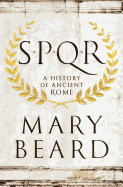
Writing about ancient peoples relies on such scant evidence that it often resembles a feat of interpretation or well-reasoned guesswork rather than a stately reconstruction of events. Thankfully, Mary Beard (Laughter in Ancient Rome) is a master interpreter, and her history of ancient Rome, S.P.Q.R., brilliantly integrates her various talents in a successful search for a more personal, accessible Rome.
Beard has written piecemeal about the classical world for decades and has a well-earned reputation as Britain's greatest living classicist. S.P.Q.R.--an acronym for Senatus Populusque Romanus, or "The Senate and People of Rome"--is, in part, a summation of all those years of research and of a very particular point of view on our modern relationship with the classics. As Beard writes at the conclusion of the book: "I no longer think, as I once naively did, that we have much to learn directly from the Romans.... But I am more and more convinced that we have an enormous amount to learn... by engaging with the history of the Romans."
With that perspective in mind, Beard uses S.P.Q.R. to correct modern myths about the Romans and to examine carefully ancient myths that the Romans often accepted as historical fact. Beard's skillful exegesis of Rome's strange founding story reveals far more about the Roman character than dry retellings of countless military campaigns, and she characterizes Rome and its various contemporary chroniclers as unreliable narrators who reveal just as much as they obscure with their self-serving exaggerations, propaganda and outright lies. Beard recasts hoary old Romans as dynamic people and ancient history as a continuing conversation with distant, yet familiar, participants. --Hank Stephenson, bookseller, Flyleaf Books

